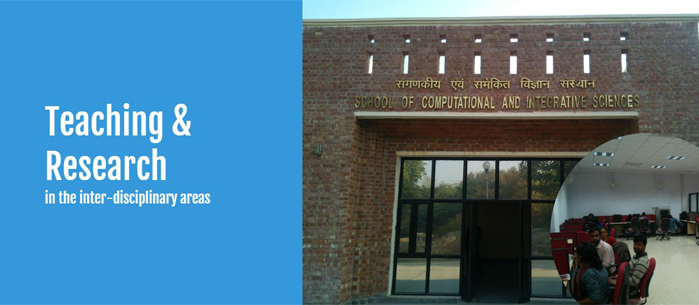Erstwhile the School of Information Technology (SIT) established in the year 2001 and renamed as School of Computational and Integrative Sciences (SC&IS) in 2010, the School carries out teaching and research in the inter-disciplinary areas of computational genomics, bioinformatics & drug discovery, database management & systems biology, high performance computing and artificial intelligence. The aim of the School is to innovate and integrate computational and analytical approaches adopted in different branches of sciences to find solutions. Rapid advancement in science and the cutting edge technologies enable and drive research in a big way, providing the opportunity to innovate. The School’s academic and research programs are currently focused on the core area of computational and systems biology with future emphasis on the study of complex systems, high density data analysis, theoretical biophysical chemistry and computational neurosciences.
Thrust Areas for research :
- Computational Genomics
- Development of Tools in Bioinformatics
- Structure based Bioinformatics and in silico Drug Discovery
- Systems Biology
- Statistical Modeling
- Systems Biology
- Complex System Studies
- Crop Genetics & Informatics
- Machine/deep learning for Biological Data Analysis
- Mathematical Biology
- Computational RF and Antenna
- Biomolecular Simulations
- Computational Biophysics
- High-Throughput Sequencing Data Analysis/Genome Informatics
- Petri Nets and Graph Theory

Programme of Study : We offer.....Read More..about Programmes
The school offers a Master’s degree (M.Sc.) in Computational and Integrative Sciences, Post- Graduate Diploma (PGD) in Big Data Analytics and Ph.D. degree. All the teaching and research programmes implemented in the School have been conceptualized as interdisciplinary programs.
 M.Sc. in Computational and Integrative Sciences
M.Sc. in Computational and Integrative Sciences
The School runs a M. Sc. program in Computational and Integrative Sciences with specializations in Computational Biology and Complex Systems. The admission to the M. Sc. program is through two different modes as per details given in the admission procedure, one of which is supported by the Department of Biotechnology (DBT), Government of India.
The program aims to provide a rigorous training and equipping the students with theoretical understanding and practical mastery in state-of-art applications of computational approaches and experimental techniques to model and analyze the biological and complex systems.
 P.G. Diploma in Big Data Analytics
P.G. Diploma in Big Data Analytics
The School runs a PG Diploma program in Big Data Analytics. This skill-development program is aimed at training postgraduates in the upcoming field of Big Data analytics for life sciences, health and other areas. The students from this program are expected to learn key technologies of data sciences, such as machine learning, data integration and modelling technologies, which can be applied in academic and industry environment in future.
 Ph.D in Computational and Integrative Sciences
Ph.D in Computational and Integrative Sciences
The School encourages intake from multiple disciplines into its Ph. D. programme, which are grouped with independently specified intake requirements as (a) Physical Sciences (Track 1) (b) Biological Sciences (Track 2) and (c) Mathematical and Computer Sciences (Track 3), to provide an optimal peer-group of analytical, domain and computational skills within each program. The School offers advanced courses for the Ph.D. students to complete the credit requirements as per the UGC/University guidelines.
